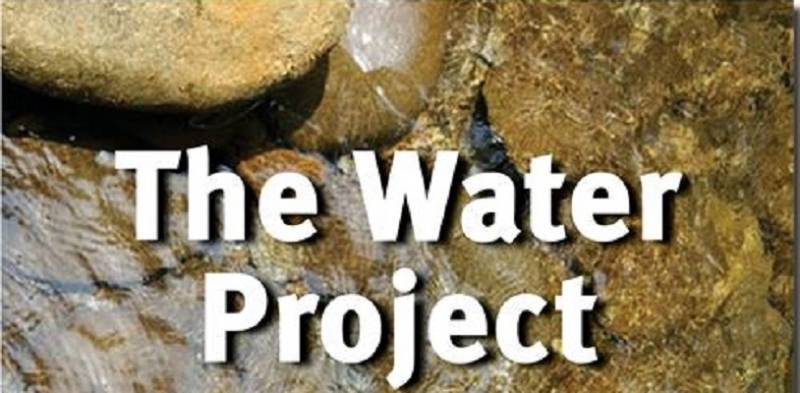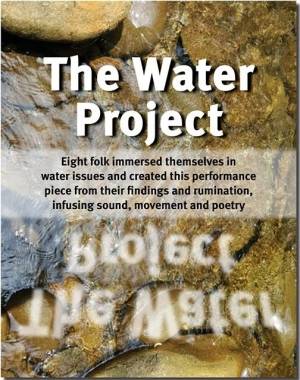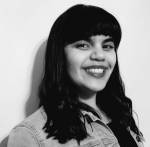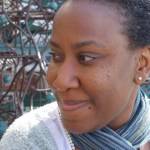
Urbana has a certain reputation, right? We do have the largest Birkenstock store in … anywhere. And while the eastern burg might take some good-natured ribbing about being the crunchier half of our twin cities, the national news is making me feel like we could use a little more Urbana (right this very minute).
EPA defunded? National Parks silenced? All the efforts in Standing Rock just being bulldozed through? Poisoned wells in Michigan?
There are plenty of examples of insanity trickling down from the top, and while the craziest bits make it seem like we won’t survive long enough to be effected by a water shortage… well, maybe the tiny cowering optimist in me still thinks we should take some care of what we’ve got just in case we’re not blown up soon.
 Latrelle Bright certainly seems to feel this way, and has for a while. This Earth Day weekend, she’s used a handful of local and national grants to put together a show that is very dear to her about something that should be dear to all of us. The Water Project brings together the visions of eight artists to express deep emotions about the one thing we can all agree is vital to life, no matter what other beliefs we hold.
Latrelle Bright certainly seems to feel this way, and has for a while. This Earth Day weekend, she’s used a handful of local and national grants to put together a show that is very dear to her about something that should be dear to all of us. The Water Project brings together the visions of eight artists to express deep emotions about the one thing we can all agree is vital to life, no matter what other beliefs we hold.
The cast and crew consists of artists of many ages, backgrounds and disciplines: from a highschool screenwriter/actress to college students and graduates, storytellers to sound designers, directors to dancers. Kate Insolia, Efadul Huq, Maddie Terlap, Madelyn Childress, Rosanne Brighton and Latrelle Bright, Yu-Yun Hsieh and Katie Fenton have all brought their unique gifts to this production which has been gradually evolving since 2009. Director Bright says, “What this piece could be has shifted often…everyone has contributed to the content and shape of the piece. It is not what I initially imagined it would be and I love and appreciate what we’ve created together.”
 So, my main question to the cast was, “What exactly have you created?” In the best way, I got various answers. Madelyn Childress (pictured right) told me that “Some people are performing their own writings, while some perform what others wrote,” and compared it to an anthology, which is echoed by Katie Fenton’s revelation that it isn’t one narrative plot, “but rather
So, my main question to the cast was, “What exactly have you created?” In the best way, I got various answers. Madelyn Childress (pictured right) told me that “Some people are performing their own writings, while some perform what others wrote,” and compared it to an anthology, which is echoed by Katie Fenton’s revelation that it isn’t one narrative plot, “but rather  smaller narratives intertwined and held together by this central idea of water.” We know that there will be stories, and I have to presume that having two dancers on board means there will be some elements of dance present, as well. And Bright has earned a reputation for interpretative theatre, something which definitely factored into the formation of this group of performers.
smaller narratives intertwined and held together by this central idea of water.” We know that there will be stories, and I have to presume that having two dancers on board means there will be some elements of dance present, as well. And Bright has earned a reputation for interpretative theatre, something which definitely factored into the formation of this group of performers.
 To a person, each response to the question, “What made you interested in the project?” included some variation of the words, “I wanted to work with Latrelle.” Bright has made a name for herself here and throughout the country as a strong voice in social theatre, creating original works and directing plays that tackle important topics. Not finding an easy home for her type of theatre, she was worked slowly to create that space and is recognized within the arts community for doing so. After earning a grant from the Puffin Foundation and from the Urbana Arts Program, she’s finally able to bring one of her unique visions to local audiences, and has found enthusiastic support from her collaborators and cast.
To a person, each response to the question, “What made you interested in the project?” included some variation of the words, “I wanted to work with Latrelle.” Bright has made a name for herself here and throughout the country as a strong voice in social theatre, creating original works and directing plays that tackle important topics. Not finding an easy home for her type of theatre, she was worked slowly to create that space and is recognized within the arts community for doing so. After earning a grant from the Puffin Foundation and from the Urbana Arts Program, she’s finally able to bring one of her unique visions to local audiences, and has found enthusiastic support from her collaborators and cast.
While not every cast member began the project as an environmental activist, Bright mentioned that “we learned more than one 45-minute performance piece could ever hold…everything we’ve discussed […] is a part of us now and a lot of it is in the show, if not directly evident.” Childress admitted she’d never done an environmental piece before, and Fenton said of listening to Latrelle speak, “—it’s hard not to become inspired.”
 On the other hand, two other members have long and complicated histories with water. Kate Insolia, Artistic Director of the Urbana Dance Company, has Lakota relatives in the Lower Brule Reservation in South Dakota and found herself suddenly reconnected with the importance of water during the recent conflict surrounding the Access Pipeline. “Thinking about our environment and natural resources is a place I don’t often put my mind, but … I was launched into protecting water for life and for native peoples’ fight to not be displaced yet again.”
On the other hand, two other members have long and complicated histories with water. Kate Insolia, Artistic Director of the Urbana Dance Company, has Lakota relatives in the Lower Brule Reservation in South Dakota and found herself suddenly reconnected with the importance of water during the recent conflict surrounding the Access Pipeline. “Thinking about our environment and natural resources is a place I don’t often put my mind, but … I was launched into protecting water for life and for native peoples’ fight to not be displaced yet again.”
I want to quote Efadul Huq’s response in its entirety, because he is credited as a storyteller, and I think this perfectly illustrates why:
“My relationship to water is complicated. I grew up in Bangladesh, a fertile region crisscrossed by over 600 rivers and haunted by a colonial
past. I grew up reading stories about the first colonial enclaves, slave trade and piracy in Bengal’s port regions. As children, we experienced floods where water would creep into our home. Then there were the beautiful monsoon rains, calming and pleasurable. And sitting by riverside, enjoying freshly-caught fried fish. And the travels by boats to see my grandparents. At home there were times when water taps didn’t work and usually the women in the house would walk to get water from far away. Too many memories. Too many stories layering on top of each other…”
I can imagine (thanks to the magic of film and the internet) some of those scenes very clearly, and if his words have helped form this performance, then I think the audience is in for an illustrative experience.
Each performer spoke a little bit about the commoditization of water, and how it belongs to no one. How this water we have is the same stretching back throughout history, thanks to the water cycle, and will be the same throughout all time moving forward.
Assuming we live through the next month or two, we should be prepared to not only protect it, but defend it. Attending a performance of The Water Project might be a small way to start, but it should be an enjoyable one, and one that will connect you to others in the community who value the future of our existence just as much.
The Water Project will be presented at the IMC twice a night – at 7 p.m. and 8:30 p.m. – on both April 21st and 22nd. There will be a free encore performance on Sunday, April 23rd at 7 p.m. Tickets are available online, and are $12 either in advance or at the door. More information is available on the facebook event page.
This performance was made possible by the Puffin Foundation, Fractured Atlas, and an Urbana Arts Grant, which will be formally announced between 5-7 p.m. on Friday, April 21st. Maybe make it a double-feature in downtown Urbana?
All images from the event website.









 past. I grew up reading stories about the first colonial enclaves, slave trade and piracy in Bengal’s port regions. As children, we experienced floods where water would creep into our home. Then there were the beautiful monsoon rains, calming and pleasurable. And sitting by riverside, enjoying freshly-caught fried fish. And the travels by boats to see my grandparents. At home there were times when water taps didn’t work and usually the women in the house would walk to get water from far away. Too many memories. Too many stories layering on top of each other…”
past. I grew up reading stories about the first colonial enclaves, slave trade and piracy in Bengal’s port regions. As children, we experienced floods where water would creep into our home. Then there were the beautiful monsoon rains, calming and pleasurable. And sitting by riverside, enjoying freshly-caught fried fish. And the travels by boats to see my grandparents. At home there were times when water taps didn’t work and usually the women in the house would walk to get water from far away. Too many memories. Too many stories layering on top of each other…”